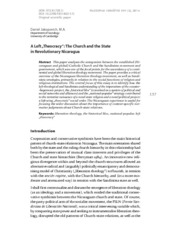A Left „Theocracy" : The Church and the State in Revolutionary Nicaragua
Апстракт
This paper analyses the antagonism between the established (Ni¬caraguan and global) Catholic Church and the Sandinista movement and government, which was one of the focal points for the ascendancy of a conti¬nental and global liberation theology movement. The paper provides a critical overview of the Nicaraguan liberation theology movement, as well as Sandi¬nista strategies, primarily in relation to the social functions of religion and religious institutions. The central focus of this essay is to identify how the left-theological and Sandinista understanding of the imperatives of the counter¬-hegemonic project, the „historical bloc“ (conceived as a system of political and social networks and alliances) and the „national-popular“strategy contributed to the tentative naissance of a novel state religion and a novel political project: a left-wing „theocratic“ social order. The Nicaraguan experience is useful for focusing the wider discussion about the importance of context-specific nor¬mat...ive judgments about Church-state relations.
Кључне речи:
liberation theology / the historical bloc / national popularИзвор:
Filozofija i društvo / Philosophy and Society, 2014, 157-178Издавач:
- Beograd : Institut za filozofiju i društvenu teoriju
Институција/група
IFDTTY - JOUR AU - Jakopovich, Daniel PY - 2014 UR - http://rifdt.instifdt.bg.ac.rs/123456789/209 AB - This paper analyses the antagonism between the established (Ni¬caraguan and global) Catholic Church and the Sandinista movement and government, which was one of the focal points for the ascendancy of a conti¬nental and global liberation theology movement. The paper provides a critical overview of the Nicaraguan liberation theology movement, as well as Sandi¬nista strategies, primarily in relation to the social functions of religion and religious institutions. The central focus of this essay is to identify how the left-theological and Sandinista understanding of the imperatives of the counter¬-hegemonic project, the „historical bloc“ (conceived as a system of political and social networks and alliances) and the „national-popular“strategy contributed to the tentative naissance of a novel state religion and a novel political project: a left-wing „theocratic“ social order. The Nicaraguan experience is useful for focusing the wider discussion about the importance of context-specific nor¬mative judgments about Church-state relations. PB - Beograd : Institut za filozofiju i društvenu teoriju T2 - Filozofija i društvo / Philosophy and Society T1 - A Left „Theocracy" : The Church and the State in Revolutionary Nicaragua SP - 157 EP - 178 DO - 10.2298/FID1402157J ER -
@article{
author = "Jakopovich, Daniel",
year = "2014",
abstract = "This paper analyses the antagonism between the established (Ni¬caraguan and global) Catholic Church and the Sandinista movement and government, which was one of the focal points for the ascendancy of a conti¬nental and global liberation theology movement. The paper provides a critical overview of the Nicaraguan liberation theology movement, as well as Sandi¬nista strategies, primarily in relation to the social functions of religion and religious institutions. The central focus of this essay is to identify how the left-theological and Sandinista understanding of the imperatives of the counter¬-hegemonic project, the „historical bloc“ (conceived as a system of political and social networks and alliances) and the „national-popular“strategy contributed to the tentative naissance of a novel state religion and a novel political project: a left-wing „theocratic“ social order. The Nicaraguan experience is useful for focusing the wider discussion about the importance of context-specific nor¬mative judgments about Church-state relations.",
publisher = "Beograd : Institut za filozofiju i društvenu teoriju",
journal = "Filozofija i društvo / Philosophy and Society",
title = "A Left „Theocracy" : The Church and the State in Revolutionary Nicaragua",
pages = "157-178",
doi = "10.2298/FID1402157J"
}
Jakopovich, D.. (2014). A Left „Theocracy" : The Church and the State in Revolutionary Nicaragua. in Filozofija i društvo / Philosophy and Society Beograd : Institut za filozofiju i društvenu teoriju., 157-178. https://doi.org/10.2298/FID1402157J
Jakopovich D. A Left „Theocracy" : The Church and the State in Revolutionary Nicaragua. in Filozofija i društvo / Philosophy and Society. 2014;:157-178. doi:10.2298/FID1402157J .
Jakopovich, Daniel, "A Left „Theocracy" : The Church and the State in Revolutionary Nicaragua" in Filozofija i društvo / Philosophy and Society (2014):157-178, https://doi.org/10.2298/FID1402157J . .


